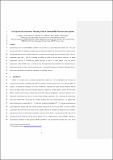| dc.contributor.author | Zhang, Yingjia | |
| dc.contributor.author | El-Merhubi, Hilal | |
| dc.contributor.author | Lefort, Benoîte | |
| dc.contributor.author | Le Moyne, Luis | |
| dc.contributor.author | Curran, Henry J. | |
| dc.contributor.author | Kéromnès, Alan | |
| dc.date.accessioned | 2019-01-11T09:50:50Z | |
| dc.date.issued | 2017-11-28 | |
| dc.identifier.citation | Zhang, Yingjia, El-Merhubi, Hilal, Lefort, Benoîte, Le Moyne, Luis, Curran, Henry J., & Kéromnès, Alan. (2018). Probing the low-temperature chemistry of ethanol via the addition of dimethyl ether. Combustion and Flame, 190, 74-86. doi: 10.1016/j.combustflame.2017.11.011 | en_IE |
| dc.identifier.issn | 1556-2921 | |
| dc.identifier.uri | http://hdl.handle.net/10379/14790 | |
| dc.description.abstract | Considering the importance of ethanol (EtOH) as an engine fuel and a key component of surrogate fuels, the further understanding of its auto-ignition and oxidation characteristics at engine-relevant conditions (high pressures and low temperatures) is still necessary. However, it remains difficult to measure ignition delay times for ethanol at temperatures below 850 K with currently available facilities including shock tube and rapid compression machine due to its low reactivity. Considering the success of our recent study of toluene oxidation under similar conditions [38], dimethyl ether (DME) has been selected as a radical initiator to explore the low-temperature reactivity of ethanol. In this study, ignition delay times of ethanol/DME/'air' mixtures with blending ratios of 100% EtOH, 70%/30% EtOH/DME and 50%/50% EtOH/DME mixtures were measured in a rapid compression machine and in two high-pressure shock tubes at conditions relevant to internal combustion engines (20-40 atm, 650-1250 K and equivalences ratios of 0.5-2.0). The influence of these conditions on the auto-ignition behavior of the mixture blends was systematically investigated. Our results indicate that, in the low temperature range (650-950 K), increasing the amount of DME in the fuel mixture significantly increases the reactivity of ethanol. At higher temperatures, however, there is almost no visible impact of the fuel mixture composition, whereas DME shows a lower reactivity. Furthermore, with the addition of DME, different kinetic regimes were observed experimentally: the reactivity is controlled by ethanol when the addition of DME is less than 30% while it is dominated by DME when the proportion of DME is over 50%. Literature mechanisms show reasonable agreement with the new experimental data for the 100% EtOH and the 70%/30% EtOH/DME mixtures but under-predict the reactivity of the 50%/50% EtOH/DME mixtures at temperatures below 850 K, suggesting that further refinement of the low-temperature chemistry of ethanol/DME is warranted. An updated binary fuel mechanism is therefore proposed by incorporating the latest experimental and/or theoretical work in the literature, as well as adding new reaction pathways. Results indicate that the proposed model is in satisfactory agreement with all of the mixtures investigated. (C) 2017 The Combustion Institute. Published by Elsevier Inc. All rights reserved. | en_IE |
| dc.description.sponsorship | The work at Xi'an Jiaotong University was supported by the National Natural Science Foundation of China (no. 91541115) and the Fundamental Research Funds for the Central Universities. The work at DRIVE laboratory was supported by French National Research Agency under the ANR project SHOCK (ANR-13-JS09-0013-01) and the Council of Burgundy (Project STM3D). | en_IE |
| dc.format | application/pdf | en_IE |
| dc.language.iso | en | en_IE |
| dc.publisher | Elsevier | en_IE |
| dc.relation.ispartof | Combustion And Flame | en |
| dc.rights | Attribution-NonCommercial-NoDerivs 3.0 Ireland | |
| dc.rights.uri | https://creativecommons.org/licenses/by-nc-nd/3.0/ie/ | |
| dc.subject | Ignition delay times | en_IE |
| dc.subject | Ethanol | en_IE |
| dc.subject | DME | en_IE |
| dc.subject | Low-temperature chemistry | en_IE |
| dc.subject | RAPID COMPRESSION MACHINE | en_IE |
| dc.subject | LAMINAR BURNING VELOCITY | en_IE |
| dc.subject | PRESSURE FLOW REACTOR | en_IE |
| dc.subject | SHOCK-TUBE | en_IE |
| dc.subject | RATE CONSTANTS | en_IE |
| dc.subject | THERMAL-DECOMPOSITION | en_IE |
| dc.subject | CHEMICAL-KINETICS | en_IE |
| dc.subject | IGNITION DELAY | en_IE |
| dc.subject | LIQUID FUELS | en_IE |
| dc.subject | GAS-PHASE | en_IE |
| dc.title | Probing the low-temperature chemistry of ethanol via the addition of dimethyl ether | en_IE |
| dc.type | Article | en_IE |
| dc.date.updated | 2019-01-08T11:10:03Z | |
| dc.identifier.doi | 10.1016/j.combustflame.2017.11.011 | |
| dc.local.publishedsource | https://doi.org/10.1016/j.combustflame.2017.11.011 | en_IE |
| dc.description.peer-reviewed | peer-reviewed | |
| dc.contributor.funder | National Natural Science Foundation of China | en_IE |
| dc.contributor.funder | Fundamental Research Funds for the Central Universities | en_IE |
| dc.contributor.funder | Agence Nationale de la Recherche | en_IE |
| dc.description.embargo | 2019-11-28 | |
| dc.internal.rssid | 14218198 | |
| dc.local.contact | Henry Curran, Dept Of Chemistry, Room 215, Arts/Science Building, Nui Galway. 3856 Email: henry.curran@nuigalway.ie | |
| dc.local.copyrightchecked | Yes | |
| dc.local.version | ACCEPTED | |
| nui.item.downloads | 299 | |


